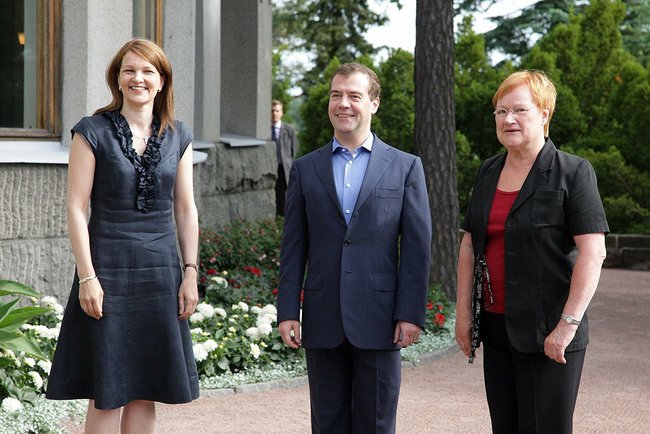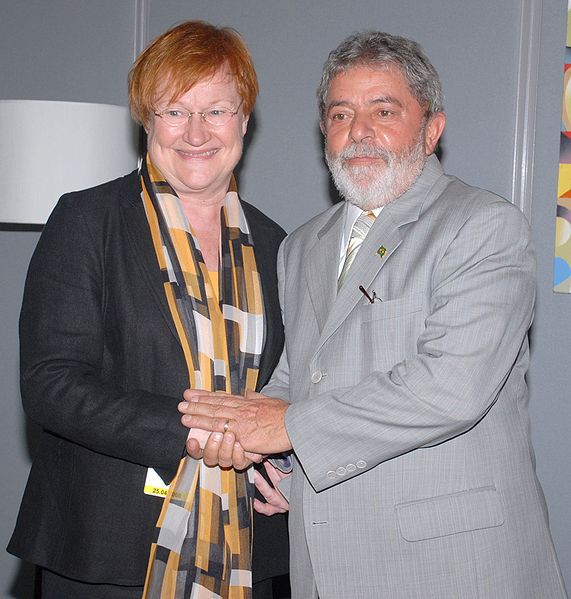<Back to Index>
- 11th President of Finland Tarja Kaarina Halonen, 1943
PAGE SPONSOR
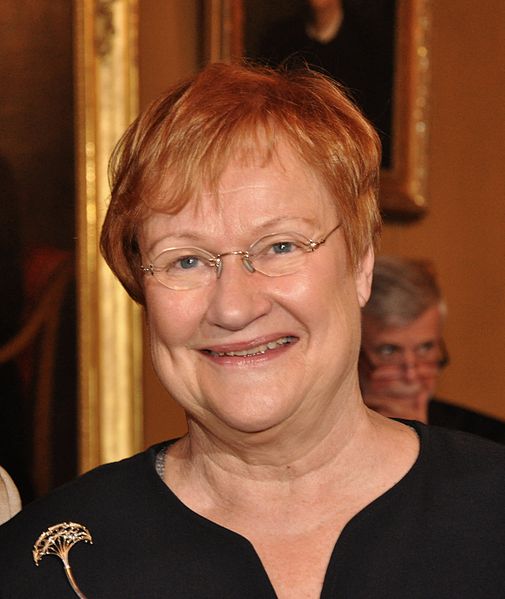
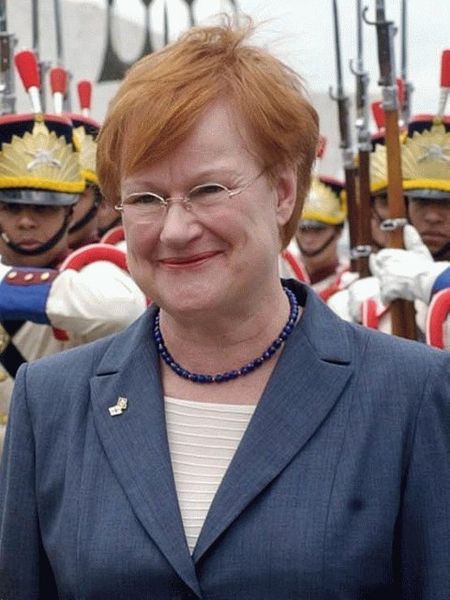
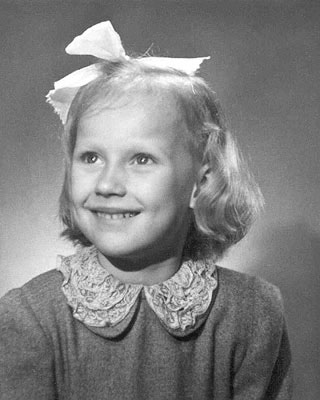
Tarja Kaarina Halonen (born 24 December 1943) was the 11th President of Finland. The first female to hold the office, Halonen had previously been a member of the parliament from 1979 to 2000 when she resigned after her election to the presidency. In addition to her political career she had a long and extensive career in trade unions and different non - governmental organizations.
Halonen is a graduate of the University of Helsinki,
where she studied law from 1963 to 1968. She was active in student
politics and served as the Social Affairs Secretary and Organization
Secretary of the National Union of Students from 1969 to 1970. In 1971
she joined the Social Democratic Party and worked as a lawyer in the Central Organization of Finnish Trade Unions until she was elected to parliament in 1979.
In
early 1970 she was elected to represent the Central Organization of Finnish
Trade Unions in a committee that called for the recognition of the German Democratic Republic. Later she became the Vice President of the committee, which lobbied then President Urho Kekkonen. During the presidential elections of 2006 she was criticized by rivals for this. She
responded that the committee was formed by members from many different
political parties including conservative parties. In 1973 Finland
recognized both the German Democratic Republic and the Federal Republic of Germany.
In 1974 Prime Minister Kalevi Sorsa appointed Halonen as his parliamentary secretary. She became acquainted with the world of Finnish politics and government and her political career took a great step forward, as she went on to hold a number of public offices. Sorsa later said that he wanted his parliamentary secretary to have good ties with the trade unions of Finland and have skills in jurisprudence.
Working
in the Parliament made Halonen even more interested in politics and she
decided to take part in the municipal elections of 1976. She was
elected to the Helsinki City Council, a position she held continuously for five terms from 1977 to 1996. Additionally, in 1979 she was elected to the Parliament of Finland as a representative of the Helsinki constituency.
She served five full terms and less than a year of her sixth term in
the parliament until her inauguration as President in 2000. In the
Parliament her first formal post was as Chairman of the Social Committee
from 1984 to 1987.
In 1987, Halonen was appointed by Prime Minister Harri Holkeri to be the Minister of Social Affairs and Health in the government, a position she held until 1990. In addition to this, she served as Minister of Nordic Cooperation from 1989 until 1991, the same year in which she was also appointed chairman of the International Solidarity Foundation, a post she relinquished in 2000.
From
1990 to 1991 she served as Minister of Justice, and from 1995 until her
election as President she served as the Minister for Foreign Affairs in
the government of her Social Democratic colleague Prime Minister Paavo Lipponen.
Halonen announced in 1999 that she wished to stand as a candidate for President in the 2000 Presidential elections. In the preliminary elections of the Social Democrats Halonen ran against Pertti Paasio, a member of the European Parliament and former party chairman, and Jacob Söderman, the European Ombudsman. The incumbent, Martti Ahtisaari, refused to run in party preliminaries and thus announced that he would not run for a second term. Halonen won the preliminaries by a landslide, getting 7800 of the total of 12,800 votes.
Halonen was a surprising candidate as she did not represent many traditional values: She was known as a left wing social democratic party member, who lived in a domestic partnership, was a single parent and had resigned from the national church, the Evangelical Lutheran Church of Finland. While Halonen started from fourth place in the presidential election polls, surprisingly in the first round of the elections she got the most votes, 40.0%. Her nearest opponent, the former Prime Minister Esko Aho of the Center Party, got 34.4%.
Since
neither of the two candidates got over 50% of the votes, a second round
was held as required by Finnish Law. In the second round, Halonen
narrowly defeated her opponent with 51.6% against 48.4% thus becoming
Finland's first female President. Her first term began on 1 March 2000.
After her narrow election victory in the first election, Halonen's approval ratings rose and reached a peak of 88% in December 2003.
In a 2001 Halonen said that she is worried about the Russian response if NATO approved membership bids by Baltic countries. Latvian President Vaira Vike - Freiberga asked what she meant and whether Halonen is actively opposing NATO membership of Baltic countries.
In the Iraqgate scandal, Halonen's advisor Martti Manninen leaked confidential documents to the Center Party leader Anneli Jäätteenmäki, who had become Prime Minister. The revelations led to the resignation of Jäätteenmäki.
Halonen has opposed the use of landmines in Finnish military doctrine.
Halonen has defended cluster bombs and did not sign a treaty which would have banned Finland from using these kinds of weapons.
On 20 May 2005, Halonen held a press conference in Mäntyniemi where she announced her willingness to run for a second term. Officially, this was the desired answer for the SDP delegation that had visited her two days earlier. In addition to her own party's support, the leader of the Left Alliance, Suvi - Anne Siimes, gave her support for Halonen's future campaign.
SAK openly lobbied for her re-election. It used its members money on mudslinging campaigns on behalf of Halonen. In flyers, "Niinistö is presented as the horror of worker, whereas SAK supported Halonen is like a worker's dream". Halonen said she approves the flyers.
A study analyzed newspaper articles and concluded that the main newspaper Helsingin Sanomat produced almost exclusively positive tone stories about Halonen and much more negative tone articles about candidates Niinistö, Vanhanen and Hautala.
American talk show host Conan O'Brien made recurring jokes about Halonen on his show, Late Night With Conan O'Brien, because of his own resemblance to her. He endorsed Halonen and produced humorous mock campaign ads and attack ads against her opponents. He went as far as visiting Finland and meeting Halonen.
On 19 November, the SDP's party council meeting was held; praised as "the president of the whole nation", she was unanimously chosen as the presidential candidate. Shortly thereafter, the party council of the Left Alliance gave the party's official support to Halonen.
Halonen's received 46% of the first round vote in the election. Sauli Niinistö (of the National Coalition Party)
was second with 24%. They faced each other in a runoff on 29 January
2006, where Halonen was re-elected with 51.8% of the vote against Mr.
Niinistö's 48.2%. The re-election was a close call. She led in the
advance voting, but she eventually received fewer votes on the actual
voting day than Mr. Niinistö did.
In 2008, Halonen nominated SDP affiliated Ritva Viljanen for a second term in the Interior Ministry. The Council of State had nominated Ilkka Laitinen, who was unambiguously seen as the most competent candidate. During the past 50 years, only once the President has not obeyed the Council of State consensus and Halonen was accused of cronyism.
In
September 2008, Halonen was perceived to insult Estonia by saying that
the Estonians suffer from "post - Soviet stress condition". Estonian
President Toomas Hendrik Ilves commented
on the issue, saying that "Estonia has never condemned, and will not
condemn foreign affairs decisions of another EU country. It neither will
assess the psychiatric state of other EU countries". In 2009, Halonen rejected calls to apologize for Finland's attitude towards Estonian independence from the Soviet Union in 1991.
Early in her political career Halonen represented the far left wing of her former party (Social Democrat). She publicly opposed the proposed free trade agreement of the European Economic Community (EEC, later European Union) in 1973, by signing a petition along with 500 other more-or-less prominent social democrats and socialists. As an employee of the Central Organization of Finnish Trade Unions, Halonen advocated diplomatic recognition of the German Democratic Republic. Otherwise she was loyal to President Kekkonen's foreign policy, which was founded on Finnish neutrality and good relations with the Soviet Union.
Throughout her political career, Halonen has described herself as supporter of international solidarity. She describes herself as a "relative pacifist", meaning that she does not support unilateral disarmament. She has strongly defended the President's role as the commander in chief of the military. She opposes NATO membership. Her strong stands on these issues have characterized her presidential term and shaped Finnish foreign policy, in part in cooperation with the like minded former Minister for Foreign Affairs, Erkki Tuomioja.
Halonen has publicly supported SAK involvement in politics.
The
Constitution of Finland and Halonen's decision to take part in some
European Union meetings with the Prime Minister has created the
so-called "problem of two dinner plates" in Finland. Since most other
countries only have their Prime Ministers representing them, it was also
decided in Finland that the task is reserved for the Prime Minister in
most cases.
President Halonen says her interests include art history, the theater and swimming. Halonen had two cats as of 2005. She says she speaks Finnish, Swedish, and English, and is studying Estonian.
On 26 August 2000, President Halonen married her longtime partner, Dr. Pentti Arajärvi, in a civil ceremony at her official residence, Mäntyniemi, after a relationship of more than fifteen years. Halonen's adult daughter Anna, and Arajärvi's adult son Esko, acted as witnesses. Both children are from previous relationships.
In the 1960s, she left the Evangelical Lutheran Church of Finland, to which the majority of Finns belong, to protest against its policy of taxing church members and its stance against female priests. Today, the church accepts women as priests and Halonen has stated that she has no personal reason not to return to the church but refrains from doing so in order not to give a signal that might be misinterpreted. In the 1990s, Halonen acted as the chairman of Suomen setlementtiliitto, a Christian social work organization.
In 1980 – 1981 Halonen served as the chairman of SETA (Seksuaalinen Tasavertaisuus RY, Sexual Equality), the main LGBT rights organization in Finland. When she became Minister for Justice in 1990, there were high hopes among SETA members that she would stand up for gay rights. In 2003, a widely publicized incident occurred when member of parliament Tony Halme referred to Tarja Halonen as a lesbian. In a radio interview, Halme referred to his background of growing up "in the streets" and said: "We have a lesbian as president and me as parliamentarian. Everything seems possible." Although Halme intended to refer to social mobility with his comment, it was interpreted as an insult by much of the media. Halonen herself made no comment. Halme later apologized saying he had been misunderstood.
According to her authorized biography published in 2005, Halonen is critical of some unnamed members of the Finnish civil service for being gay or lesbian and not coming out and campaigning for sexual equality. She accused these closeted homosexuals of reaping the benefits of other people's work for sexual equality without contributing themselves.
